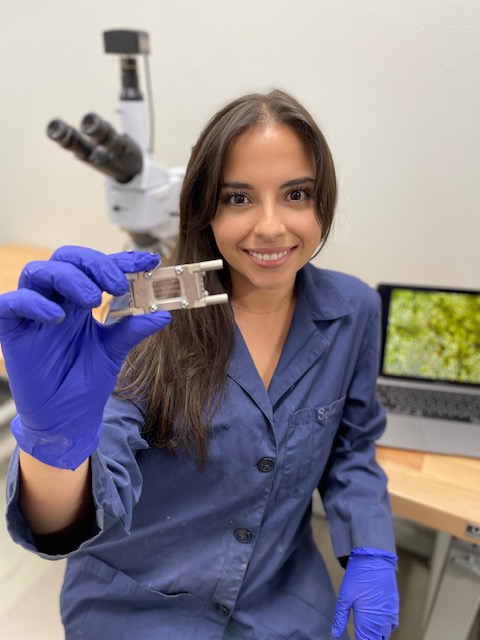
Sofia Gomez, a graduate student at the University of Texas, El Paso, credits the Sustainable Research Pathways program at Berkeley Lab with sparking her interest in science and technology. (Credit: Diego Gonzalez)
Sofia Gomez has always been interested in science. As a child, she loved playing with science kits that taught her how to find geodes, dig for dinosaur fossils, and build robots. But it wasn’t until the summer she spent working at Berkeley Lab as a Sustainable Research Pathways (SRP) participant that Gomez realized she could pursue her Ph.D. in mechanical engineering and have a career in research.
This fall, Gomez will be one of six students joining the Department of Energy’s prestigious National Nuclear Security Administration Stewardship (NNSA) Science Graduate Fellowship (SSGF). She is the first University of Texas, El Paso (UTEP) student to receive the fellowship. And with this funding, Gomez will apply additive manufacturing, machine learning, and density functional theory techniques to develop and refine syntactic foam properties for applications in aerospace and defense. She was also selected to participate in the National Science Foundation’s Graduate Research Program (NSF GRP).
“As a first-generation college graduate and woman in STEM, it didn’t occur to me that I could be in a position to pursue a doctorate in mechanical engineering or machine learning,” said Gomez. “The summer I interned at Berkeley Lab, our team was partly mentored by Tess Smidt, who had a doctorate and developed this euclidean neural network. She was very inspiring, and working with her helped me realize that I could pursue a career in research.”
Gomez came to Berkeley Lab in the summer of 2021 with her mentor Professor Jorge Muñoz, shortly after receiving her bachelor’s degree in mechanical engineering from UTEP. At the time, Gomez had accepted a full-time job with the NNSA’s Kansas City National Security Campus. But, she couldn’t pass up the opportunity to spend the summer doing research at a national laboratory.
The team worked with Berkeley Lab’s Bert de Jong, researching and developing mathematical methods to reduce the amount of computation necessary to simulate certain systems from quantum mechanics to understand their thermodynamics by leveraging machine learning.
“Before coming to Berkeley Lab, I knew what computational chemistry was, but I did know the extent to which I could use it, especially in field material science, which is an area that I am extremely passionate about,” said Gomez. “This experience helped me realize that computational chemistry is very accessible; it was something that I could learn to do as an undergraduate and apply to my graduate research and throughout my career.”
After participating in SRP, Gomez reached out to other women in STEM and thought about all the successes that she had achieved as an undergraduate researcher. “I was awarded scholarships and even won some poster presentations for my research; when I thought of all the things that I accomplished in school and how happy I was there, I realized that I should stay,” she said. “This was a turning point for me.”
So she turned down her full-time job offer and applied to the Aerospace and Mechanical Engineering program at UTEP. To support her graduate research goals, her mentor and UTEP professor, Yirong Lin, encouraged her to apply to DOE’s SSGF and the NSF’s GRP programs.
“For most of my undergraduate career, I thought I would just get my bachelor’s degree and then work a full-time job. But the summer at Berkeley Lab helped me realize that I hunger for knowledge, and I didn’t want just to stop there and work,” said Gomez. “I’ve always been so satisfied with being able to perform research, document the results, and contribute to the field of science and engineering. I never thought it would be possible to do this as my career, but it is, and I’m doing it.”
About Computing Sciences at Berkeley Lab
High performance computing plays a critical role in scientific discovery. Researchers increasingly rely on advances in computer science, mathematics, computational science, data science, and large-scale computing and networking to increase our understanding of ourselves, our planet, and our universe. Berkeley Lab's Computing Sciences Area researches, develops, and deploys new foundations, tools, and technologies to meet these needs and to advance research across a broad range of scientific disciplines.

